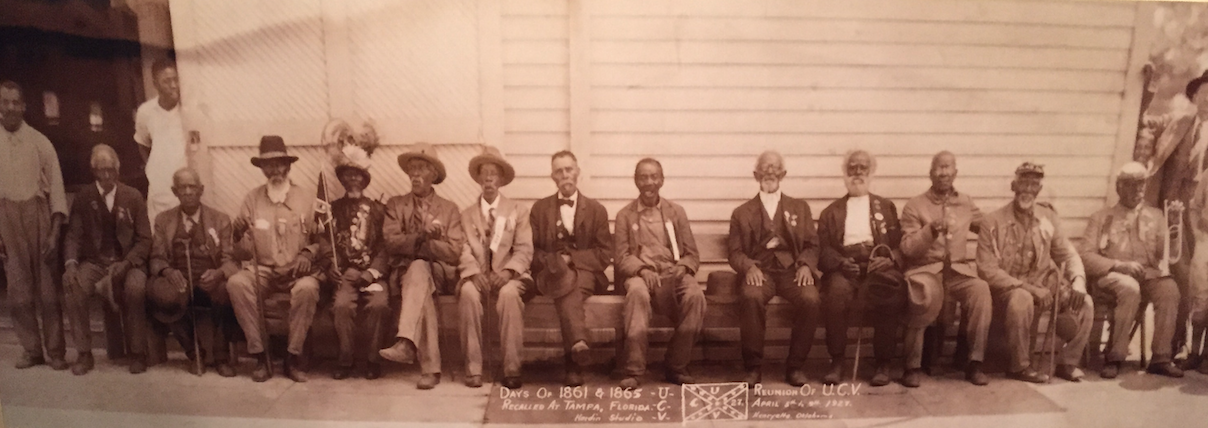I am currently researching and outlining chapter 4 of my book on Confederate camp slaves and the myth of the black Confederate soldier. The focus is on pensions that were issued to former camp slaves. This was originally to be included in another chapter, but for a number of reasons I decided to give it a separate chapter.
One of the questions that I am trying to answer is why they were issued at all. Pensions for soldiers is easily explained, but why would former Confederate states award pensions to former slaves? Some of you might think that the answer is obvious. Pensions issued to former slaves supports the myth of the Lost Cause and its emphasis on loyal slaves and a Confederate home front and army that united whites and blacks. Others might suggest that pensions signaled to the black population the kind of behavior that was expected in the period following Reconstruction and during a time of racial unrest.
All of this is true, but it leaves at least one important question unanswered. Why did the majority of former Confederate states wait until the 1920s to accept applications from former camp slaves?[fn id=”1″] Confederate veterans reunions certainly had something to do with the timing. In fact, the push to include former camp slaves can be found in the pages of Confederate Veteran. Only Mississippi included former slaves in its pension program from the beginning in 1888. Tennessee, Virginia, North Carolina and South Carolina all waited until the 1920s.
As much as I rely on the presence of former camp slaves at reunions and their reinforcement of Lost Cause themes to explain their pensions, I am left wondering about what was going on in the 1920s specifically that might help to explain the expansion of the programs in these states. Did the service of black soldiers in the U.S. army during WWI have an impact? What specifically did these states hope to achieve in the 1920s with these programs and for a relatively small group of men now in their twilight years?
Perhaps there isn’t anything more to explain beyond the Lost Cause and the continuing efforts to maintain stable race relations. Any thoughts?

Institutionalizing Jim Crow. Pensions would seem to support the “loyal slave” narrative that had become a championed song by the early 20th century. Just because it was so strongly believed in by the 1920’s does not make it a reality of the 1860’s, of course.
This may be far fetched but, the Klan was at it’s zenith in the 1920’s in terms of political power. The offering of pensions to former camp servants and laborers might have been a way for the Klan to show it’s ” benevolence” to those outside the south who were concerned about the Klan’s agenda. As you said there were a relatively small number of people involved who received these pensions so it did not cost the individual states too much.
The romantic in me just wants to believe that it was simply altruistic.
Yeah … I know. But I can dream.
I wouldn’t discount this entirely. I have found a good deal of evidence that former Confederates went out of their way to assist former slaves. It’s of course difficult to get at their motivation, but I have little doubt that a desire to be of assistance to men in need, who shared certain wartime experiences, must be part of the explanation.
An attempt to put the brakes on the Great Migration? If your elderly family members don’t need your support, you have one less reason to leave the South to seek your fortune.
Thanks, Herb. This is an interesting suggestion and one that I will keep in mind as I proceed.
Granting pensions was also a form a patronage used to influence blacks in a community where someone was receiving a pension to support the government. Further, it wasn’t granted to anyone who asked, and if an individual wasn’t on rolls, it required a specific act of the government to get the individual a pension – which entailed a political process which could be different for any given individual and in any context. Even on the Union side, the famous example of Robert Smalls is telling: he was unable to get a pension as an officer because officers in the 1890s and earlier didn’t want him to be their equal, and those officers put pressure on congress not to award him pension as an officer, although he had wider support.
Absolutely. In the case of Confederate pensions this was even more pronounced given that the process began at the local level and worked its way up to the state.
Of course, former camp slaves were not on the rolls. They were required to secure affidavits supporting their presence with their master in a certain regiment.